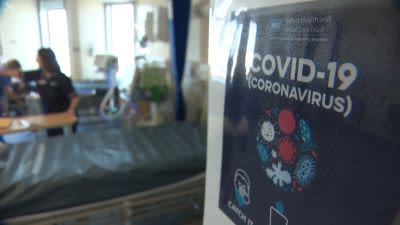Lateral flow testing extended in Northern Ireland as Covid infection levels jump

The Department of Health has updated its coronavirus guidance after a report Covid-19 infection levels jumped in Northern Ireland in the past week.
The department has also announced an extension to the lateral flow testing programme.
In a change to the guidance, adults have been advised to stay at home and avoid contact with others if they test positive for Covid for five days. It had been 10 days.
The latest figures from the Northern Ireland Statistics and Research Agency show there were six Covid-related deaths for the week up until June 24.
That brings the death toll recording the number of people to have died where coronavirus was mentioned on their death certificate to 4,658.
Last week, around one in 25 people - or around 71,000 - were thought to have had coronavirus.
That figure has increased from one in 30 people in the previous week, or around 59,900.
Health Minister Robin Swann said: “I have always said I would keep COVID-19 measures under review. It is clear that after a period of reducing case numbers we are now seeing a rise in cases.
“Whilst prevalence continues to be relatively high, thankfully the overall risk of serious illness, hospitalisation and death for those who contract Covid-19 is much lower than during previous waves.
“That said, we continue to see severe pressures in our hospitals and the contribution of COVID-19, even though admission numbers are smaller than in previous waves, adds to these pressures.
“After careful consideration I have decided to extend the availability of lateral flow testing for those with symptoms until the end of July.”
From today (Friday, 1 July), adults who test positive for Covid are advised to stay home and avoid contact with other people for five days after the day of test or from the day symptoms started. As children tend to be less infectious than adults, this period is reduced to three days for children under 18 years of age. Whilst the self-isolation period has been reduced, people are advised to avoid contact with individuals who are at higher risk from Covid for the full 10 days. They should also avoid visiting others in care homes, hospitals and other health and social care settings. Testing to end isolation is no longer advised. Mr Swann added: “This updated advice seeks to strike the right balance at this stage of the pandemic between reducing transmission, protecting the vulnerable and mitigating the disruption caused by longer periods of isolation.”
Contact tracing for the virus was formally stood down on Thursday, June 30.
The minister thanks those staff in the Public Health Agency and the wider health service who worked on contact tracing "for their exceptional professionalism and dedication over the past two challenging years".
"I would also like to thank everyone who engaged with the service, provided details of their contacts and complied with the guidance.”
The rise in infection levels has been seen across the UK, with the number of people with the virus having jumped by over half a million in the past week.
Sarah Crofts, head of analytical outputs for the Covid-19 infection survey for the Office of National Statistics, said: "Across the UK we've seen a continued increase of over half a million infections, likely caused by the growth of BA.4 and BA.5 variants.
"This rise is seen across all ages, countries and regions of England.
"We will continue to monitor the data closely to see if this growth continues in the coming weeks."
Coronavirus Q&A
Lateral flow tests are available to members of the public with Covid symptoms, including importantly those who may be eligible for Covid treatments.
Tests are also available to a small number of groups without symptoms including health and social care staff, those visiting others in health and care settings, and those providing close personal care to someone at higher risk should they contract Covid-19 . This availability has been extended for a further month.
If you have a high temperature or do not feel well enough to go to work or carry out your normal activities, stay home and minimise your contact with others until you feel well. This is the advice for all people with symptoms of respiratory infections, not just Covid-19.
You can order a test here.
What are the symptoms of coronavirus:
continuous cough
high temperature, fever or chills
loss of, or change in, your normal sense of taste or smell
shortness of breath
unexplained tiredness, lack of energy
muscle aches or pains that are not due to exercise
not wanting to eat or not feeling hungry
headache that is unusual or longer lasting than usual
sore throat, stuffy or runny nose
diarrhoea, feeling sick or being sick
Want a quick and expert briefing on the biggest news stories? Listen to our latest podcasts to find out What You Need To Know.